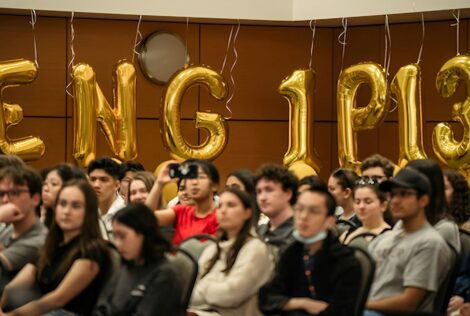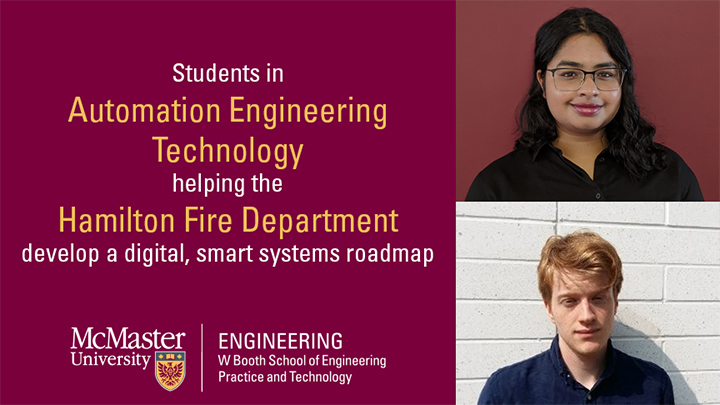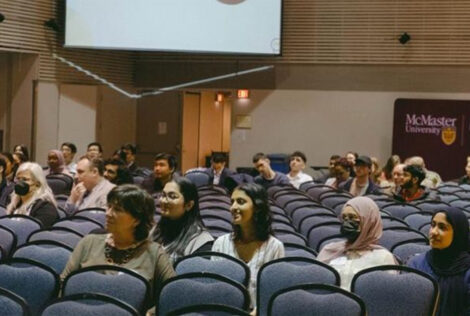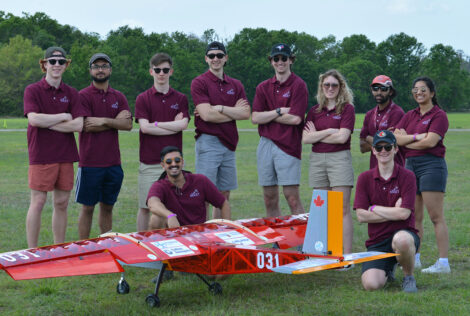

Raagave Thangeswaran and Justin Whittam-Geskes are Bachelor of Technology (BTech) students entering their final year of the Smart Systems stream in Automation Engineering Technology.

They have spent the past several months working with the City of Hamilton Fire Department and CityLAB to design a prototype for a system to support the future of firefighting and fire prevention – access to real-time data. The system they are working on is intended to process vast amounts of data produced by an Internet of Things (IoT) network of connected smart devices.
They are supporting a vision that will allow city firefighters to leverage information sent by smart smoke detectors, heat sensors, electrical panels and other connected technology to know if a fire has started, where in the building it is focused, and which areas are most dangerous to enter. While these sensors are not widely used now, they see these becoming commonplace or even mandatory in the future.
Supervising Thangeswaran and Whittam-Geskes is Tom Wanyama, automation professor with McMaster University’s W Booth School of Engineering Practice and Technology and faculty lead on this project.
“We see a scenario where a team of firefighters can have access to on-site information from their fire truck. One team member on the truck can relay information to their colleagues entering a building in an emergency. This information may include smoke is originating, whether a fire has started, where the dangerous hotspots in the building or home may be, or if there are hazards on-site like dangerous chemical storage. In the future, they may also have access to information such as older residents or residents with disabilities who may not be able to evacuate themselves,” says Wanyama.
This is a first iteration project focused on conceptualizing what smart technology will offer firefighting in Hamilton. Future student teams will be able to work on the next iteration of this project and produce a plan to implement these smart technologies over the coming years.
By equipping the city with the tools to manage data from IoT systems, we hope it will make smart firefighting technology attractive to building managers and homeowners. This is a real example of where smart technology has the possibility to save lives.
This project is helping the City of Hamilton Fire Department establish best practices and enhanced service delivery, while enabling advanced safety protocols for our firefighters. The fire department hopes to establish leadership in firefighting smart technology.
“Innovative technology is identified as a priority in our Hamilton Fire Department 10-year Service Delivery Plan. We have had the pleasure of engaging with Raagave and Justin on this project through CityLAB Hamilton and look forward to the potential of being able to provide our front line responders with additional information that will help to keep them safe and enhance the service that we are providing to the residents of the City of Hamilton,” says Dave Cunliffe, Fire Chief, City of Hamilton.
“The project excited me as an opportunity to design a complex network with hundreds of connections and the ability to process and manage the data that accompanies it,” says Whittam-Geskes.
The BTech program is delivered by McMaster in partnership with Mohawk College. It equips students with a unique blend of theory and practice, leveraging engineering principles to develop innovative technical solutions. Students graduate with a degree, an advanced diploma, a business management certificate, as well as 12 months of co-op experience.


